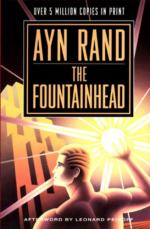|
|
The Fountainhead Topic Tracking: Individualism
Part 1, Chapter 1
Individualism 1: Howard Roark has been expelled from Stanton because he refuses to comply with what other people think of as good; he has his own ideas and does not give merit to others' ideas simply because someone else thought of them.
Part 1, Chapter 2
Individualism 2: Roark does not understand Keating's need for other people to tell him what he wants to do: "If you want my advice, Peter," he said at last, "you've made a mistake already. By asking me. By asking anyone. Never ask people. Not about your work. Don't you know what you want? How can you stand it, not to know?" Part 1, Chapter 1, pg. 33
Part 2, Chapter 11
Individualism 3: When Roark asks Steven Mallory to sculpt a statue for the Stoddard Temple, he insists that he is doing it for no other purpose than his own desire to have the best: "And so I didn't come here to do you a favor or because I felt sorry for you or because you need a job pretty badly. I came for a simple, selfish reason-the same reason that makes a man choose the cleanest food he can find. It's a law of survival, isn't it?-to seek the best. I didn't come for your sake. I came for mine." Part 2, Chapter 11, pg. 328
Part 3, Chapter 4
Individualism 4: Gail Wynand and Dominique agree that looking at nature does not make them feel small. On the contrary, it affirms their powerful place in the world. Gail says: "When I look at the ocean, I feel the greatness of man, I think of man's magnificent capacity that created this ship to conquer all that senseless space. When I look at mountain peaks, I think of tunnels and dynamite. When I look at the planets, I think of airplanes." Part 3, Chapter 4, pg. 446
Part 4, Chapter 8
Individualism 5: Roark explains to Keating that the only way he will work is if it goes exactly the way he wants it to go: "My work done my way. A private, personal, selfish, egotistical motivation. That's the only way I function. That's all I am." Part 4, Chapter 8, pg. 580
Part 4, Chapter 10
Individualism 6: Keating admits both to Katie and to himself that he committed a great wrong when he did not marry her, but for reasons that he had not known until recently: "I did hurt you, Katie, and maybe more than you know yourself. But that's not my worst guilt. . . . Katie, I wanted to marry you. It was the only thing I ever really wanted. And that's the sin that can't be forgiven-that I hadn't done what I wanted." Part 4, Chapter 10, pg. 598
Part 4, Chapter 18
Individualism 7: In his defense in the Cortlandt trial, Roark explains his position: "Independence is the only gauge of human virtue and value. What a man is and makes of himself; not what he has or hasn't done for others. There is no substitute for personal dignity." Part 4, Chapter 18, pg. 681




